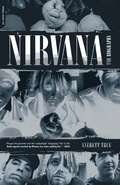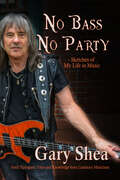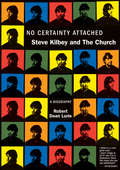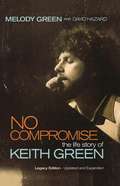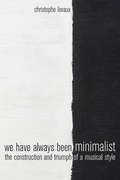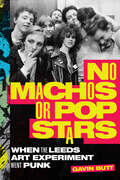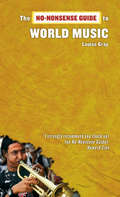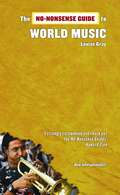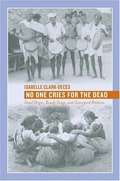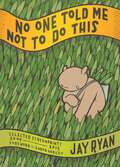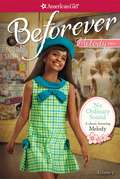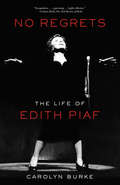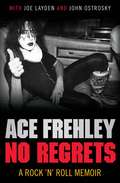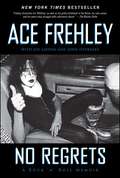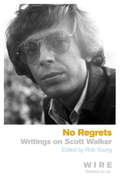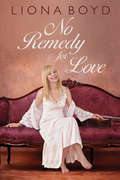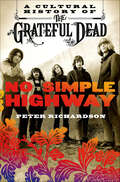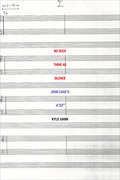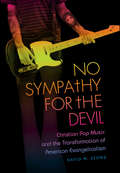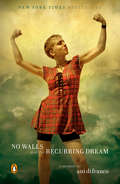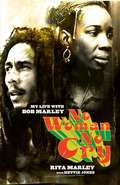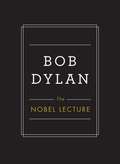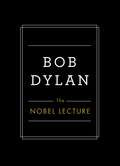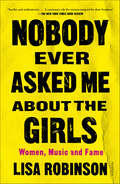- Table View
- List View
Nirvana: The Biography
by Everett TrueAs the assistant editor of Melody Maker, Everett True was the first journalist to cover the Seattle music scene in early 1989 and interview Nirvana. <P><P> He is responsible for bringing Hole, Pavement, Soundgarden, and a host of other bands to international attention. He introduced Kurt Cobain to Courtney Love, performed on stage with Nirvana on numerous occasions, and famously pushed Kurt onto the stage of the Reading Festival in 1992 in a wheelchair. Nirvana: The Biography is an honest, moving, incisive, and heartfelt re-evaluation of a band that has been misrepresented time and time again since its tragic demise in April 1994 following Kurt Cobain's suicide. True captures what the band was really like. He also discusses the music scene of the time-the fellow bands, the scenes, the seminars, the countless live dates, the friends and allies and drug dealers. Drawn from hundreds of original interviews, Nirvana: The Biography is the final word on Nirvana, Cobain, and Seattle grunge.
No Bass No Party: Sketches of my Life in Music
by null Gary ShaeIt was Christmas time, December 27th, 1950. The Feast Of Saint John. General Douglas MacArthur had just landed in Korea. Nat King Cole had the number one hit song with MonaLisa. A howling snowstorm was making its way through the Naugatuck Valley in Connecticut. A Waterbury Police patrol car had just received a radio call to proceed to St. Mary's hospital a.s.a.p. The call was special to patrolman Joseph J. Shea as his wife had just given birth to their first child. Suddenly, cut off by another car in the storm, he found his patrol car barreling down a steep hill toward the raging Naugatuck River. He eventually regained control, inches from going over the guard rail and plunging into the nighttime freezing water.
No Certainty Attached
by Robert Dean LurieFor almost thirty years, the Church have crafted music that blends a rich variety of styles in a beautiful, multi-layered sound. They have encompassed pop, psychedelic, progressive, and straight-ahead rock, yet always remain distinctive, thanks to the inimitable vocals and lyrics of front man Steve Kilbey. Based on extensive interviews and featuring over 70 rare photographs, No Certainty Attached is the first comprehensive biography of Kilbey and his band. It charts their personal and musical ups and downs: the commercial heights of The Unguarded Moment and Under the Milky Way, the creative breakthroughs of the Priest = Aura album and Kilbey s underappreciated solo work, followed by the band s struggle to survive in the wake of bad business decisions and their singer s drug indulgences. One obsessive American fan attempts to get to the heart of the story, abetted by Kilbey himself, his family, band members, and friends and foes alike. What emerges is a compelling portrait of an artist and a band clinging steadfastly to their muse in the face of external and internal obstacles and the transformative power of the music they have created.
No Compromise: The Life Story of Keith Green
by Melody GreenThe 25th Anniversary Edition of Keith Green's inspiring biography, revised and updated by his wife, Melody. This expanded biography contains many added stories and insights, never before published photos, extra selections from Keith's private journals, and glimpses into Melody's season of grieving and raising their two surviving children on her own. He was only twenty-eight when he died in a plane crash with two of his small children, but singer/songwriter Keith Green had already created a legacy of music and inspiration that would outlive him. A spiritual revolutionary, he found freedom through Jesus, not religion, and spent his last years convincing others to refuse to accept the status quo and instead to bring compassion and honesty back to the church. He touched people through vibrant lyrics in songs like "Your Love Broke Through," "You Put This Love In My Heart," and "Asleep In The Light. " Last Days Ministries, which he and his wife Melody founded, went on to challenge thousands of people to take to the mission fields of the world. Now, on the 25th anniversary of his death, Melody has updated her husband's biography with new photos, essays from current musicians who were influenced by Keith, selections from Keith's private journal, and stories about what it was like raising their two remaining children on her own.
No Documents, No Escape: The Construction and Triumph of a Musical Style
by Christophe LevauxRising out of the American art music movement of the late 1950s and 1960s, minimalism shook the foundations of the traditional constructs of classical music, becoming one of the most important and influential trends of the twentieth century. The emergence of minimalism sparked an active writing culture around the controversies, philosophies, and forms represented in the music’s style and performance, and its defenders faced a relentless struggle within the music establishment and beyond. Focusing on how facts about music are constructed, negotiated, and continually remodeled, We Have Always Been Minimalist retraces the story of these battles that—from pure fiction to proven truth—led to the triumph of minimalism. Christophe Levaux’s critical analysis of literature surrounding the origins and transformations of the stylistic movement offers radical insights and a unique new history.
No Machos or Pop Stars: When the Leeds Art Experiment Went Punk
by Gavin ButtAfter punk’s arrival in 1976, many art students in the northern English city of Leeds traded their paintbrushes for guitars and synthesizers. In bands ranging from Gang of Four, Soft Cell, and Delta 5 to the Mekons, Scritti Politti, and Fad Gadget, these artists-turned-musicians challenged the limits of what was deemed possible in rock and pop music. Taking avant-garde ideas to the record-buying public, they created Situationist antirock and art punk, penned deconstructed pop ditties about Jacques Derrida, and took the aesthetics of collage and shock to dark, brooding electro-dance music. In No Machos or Pop Stars Gavin Butt tells the fascinating story of the post-punk scene in Leeds, showing how England’s state-funded education policy brought together art students from different social classes to create a fertile ground for musical experimentation. Drawing on extensive interviews with band members, their associates, and teachers, Butt details the groups who wanted to dismantle both art world and music industry hierarchies by making it possible to dance to their art. Their stories reveal the subversive influence of art school in a regional music scene of lasting international significance.
No-Nonsense Guide to World Music (No-Nonsense Guides #31)
by Louise Gray“World music” is an awkward phrase. Used to describe the hugely multifaceted nature of a range of, typically, non-English language popular musics from the world over, it’s a tag that throws up as many problems as it does solutions. Louise Gray’s No-Nonsense Guide to World Music attempts to go behind the phrase to explore the reasons for the contemporary interest in world music: who listens to it and why? Through chapters that focus on specific areas of music, such as rembetika, fado, trance music and new folk, it explores the genres that have emerged from marginalized communities, music from conflict zones, and music as a form of escapism.
The No-Nonsense Guide to World Music
by Louise Gray"World music" is an awkward phrase. Used to describe the hugely multifaceted nature of a range of typically non-English-language popular music from the world over, it's a tag that throws up as many problems as it does solutions.Louise Gray's The No-Nonsense Guide to World Music attempts to go behind the phrase to explore the reasons for the contemporary interest in world music, who listens to it, and why. Through chapters that focus on specific areas of music, such as rembetika, fado, trance music, and new folk, Gray explores the genres that have emerged from marginalized communities, music in conflict zones, and music as escapism.In this unique guide, which combines the seduction of sound with politics and social issues, the author makes the case for music as a powerful tool able to bring individuals together.Louise Gray is a writer and editor whose work on music and performing arts has appeared in the New Internationalist, The Wire, The Independent on Sunday, the Guardian, and Art Review. She co-edited Sound and the City (British Council, 2007), a book exploring the changing soundworld of China.
No One Cries for the Dead: Tamil Dirges, Rowdy Songs, and Graveyard Petitions
by Isabelle Clark-DecèsAt South Indian village funerals, women cry and lament, men drink and laugh, and untouchables sing and joke to the beat of their drums. No One Cries for the Dead offers an original interpretation of these behaviors, which seem almost unrelated to the dead and to the funeral event. Isabelle Clark-Dece's demonstrates that rather than mourn the dead, these Tamil funeral songs first and foremost give meaning to the caste, gender, and personal experiences of the performers.
No One Told Me Not to Do This: Selected Screenprints, 2009-2015
by Jay RyanOne of Indie Rock's Best Poster Artists (Pitchfork)"Ryan has been making strange little creatures since the mid-’90s, most often for bands in the Chicago area looking to promote concerts with something splashier than a Xeroxed flyer. His work is unmistakable: Whether it’s a bunch of animals cozied up under the covers or a smashed-up satellite advertising a Hum reunion, there’s nothing else exactly like it (and nothing nearly as charming)."--The A.V. Club, staff pick"Whether his subjects are whales, bears, mastodons, astronauts, dinosaurs, or his dilapidated garage, they’re rendered in warm colors, bold lines, and an instantly recognizable, beguiling and cartoonish style. If you lack sufficient wall space for another dozen of Ryan’s posters, get this."--The Big Takeover"The third collection of Ryan’s screen-printed work, covering 2009-2015, includes more than 50 band posters (Andrew Bird, Sonic Youth, St. Vincent) plus several festival posters."-- Publishers Weekly"A new select collection of recent poster and commercial work of artist Jay Ryan - someone whose crazy skills really do put the GREAT in 'greatest hits.’ It's rock poster art, alt-movie poster art and more."--Atomic Books Comic Preview, Largehearted Boy"[The book] features Ryan’s colorful and distinctive artwork, most of which are concert posters, including those for shows by queer artists including Bob Mould and St. Vincent."-- Living Out LI"An exceptional guide to not just Jay Ryan's art, but to the process involved in making superior screenprints."--Donovan's Literary Services, a Prime PickThis third collection of Ryan's "greatest hits" features prints made between 2009 and 2015, including posters for bands such as Andrew Bird, Shellac, My Morning Jacket, Sonic Youth, Dinosaur Jr., Hum, St. Vincent, and others, as well as posters featuring Lil BUB, Cards Against Humanity, various bicycle races, film screenings, and pictures of sloths, walruses, and other mammals in states of troubled sleep. With a foreword by master illustrator Aaron Horkey, this volume comprises two hundred screenprints with commentary and original drawings used in the screenprinting process.
No Ordinary Sound: A Melody Classic (Beforever #Volume 1)
by Denise Lewis PatrickMelody is an optimistic, enthusiastic girl growing up in Detroit, Michigan during the Civil Rights Movement of the 1960s. She is excited and proud to share a special surprise with her family. She's been chosen to sing a solo for Youth Day at her church! But what song will she choose? She gets advice from her big brother, and is also inspired by her older sister, but it's the inspirational words of Dr. Martin Luther King Jr. that help her pick the perfect song. There are many unfair things happening during Melody's time, even to people in her own family. But it's an unimaginable tragedy in the South that leaves Melody silent. Who can help her lift her voice and sing? Who will inspire her to keep stepping?
No Regrets: The Life of Edith Piaf
by Carolyn Burke"Sympathetic . . . captivating . . . highly effective." --Graham Robb, New York Review of Books "Concise and gracefully written. . . . Burke surveys all [Piaf's] mayhem with thoughtfulness and respect." --James Gavin, New York Times Book Review The iconic French singer comes to life in this enthralling, definitive biography, which captures Edith Piaf's immense charisma along with the time and place that gave rise to her unprecedented international career. Raised by turns in a brothel, a circus caravan, and a working-class Parisian neighborhood, Piaf began singing on the city's streets, where she was discovered by a Champs-Elysees cabaret owner. She became a star almost overnight, seducing Paris's elite and the people of its slums in equal measure with her powerful, passionate voice. No Regrets explores her rise to fame and notoriety, her tumultuous love affairs, and her struggles with drugs, alcohol, and illness, while also drawing on new sources to enhance our knowledge of little-known aspects of her life. Burke demonstrates how, with her courage, her incomparable art, and her universal appeal, "the little sparrow" endures as a symbol of France and a source of inspiration to entertainers worldwide. Carolyn Burke is the author of Lee Miller: A Life and Becoming Modern: The Life of Mina Loy. She has taught at the University of California at Santa Cruz and Davis and at universities in France and Australia, where she was born. She now lives in California.
No Regrets
by Ace Frehley Joe LaydenBorn into a regular Bronx family, and inspired by the likes of Hendrix, Led Zepellin, and the Kinks, Ace Frehley first picked up his brother's guitar at the age of 12. He had already performed in a number of bands when, in January 1973, he auditioned for an ad that read: "Guitarist wanted with flash and balls. " Within a week he was invited to join - the band was KISS. Frehley explains how the band developed their style in the early days, making their own clothes, wearing make-up and platform shoes. Ace himself even designed the band's double lightning bolt logo. Before long his persona "the Spaceman" was born and the familiar KISS look established - almost overnight they left behind 1,500 seater theatres in the Midwest and were playing sold-out stadiums around the world. Life in KISS was a whirlwind of accidents, overdoses and excess. Ace partied with the likes of John Belushi and Nic Nolte and enjoyed the seemingly endless supply of fringe benefits that came from being in one of the most successful bands in the history of rock 'n' roll. But soon problems with substance abuse would lead to his leaving the band in 1982, before returning for a second tenure in 1996. Ace in the Hole is the story of KISS but much more than that - it's the story of a kid from the Bronx who found purpose and salvation through music and rose to the top. It's the story of a guy who lived life to the fullest and almost forfeited his life as a result. And ultimately it's a survival story - Ace is alive and kicking, still making music and influencing a new generation of guitarists.
No Regrets: A Rock 'n' Roll Memoir
by Ace Frehley Joe Layden John OstroskyTHE MUSIC, THE MAKEUP, THE MADNESS, AND MORE. . . . In December of 1972, a pair of musicians placed an advertisement in the Village Voice: “GUITARIST WANTED WITH FLASH AND ABILITY.” Ace Frehley figured he had both, so he answered the ad. The rest is rock ’n’ roll history.He was just a boy from the Bronx with stars in his eyes. But when he picked up his guitar and painted stars on his face, Ace Frehley transformed into “The Spaceman”—and helped turn KISS into one of the top-selling bands in the world. Now, for the first time, the beloved rock icon reveals his side of the story with no-holds-barred honesty . . . and no regrets.For KISS fans, Ace offers a rare behind-the-makeup look at the band’s legendary origins, including the lightning-bolt logo he designed and the outfits his mother sewed. He talks about the unspoken division within the band—he and Peter Criss versus Paul Stanley and Gene Simmons—because the other two didn’t “party every day.” Ace also reveals the inside story behind his turbulent breakup with KISS, their triumphant reunion a decade later, and his smash solo career. Along the way, he shares wild stories about dancing at Studio 54 with “The Bionic Woman,” working as a roadie for Jimi Hendrix, and bar-flying all night with John Belushi. In the end, he comes to terms with his highly publicized descent into alcohol, drugs, and self-destruction—ultimately managing to conquer his demons and come out on top. This is Ace Frehley.No makeup.No apologies.No regrets.
No Regrets: Writings on Scott Walker
by Rob YoungA colourful collection of pieces on the enigmatic genius of Scott Walker from THE WIRE.Scott Walker has travelled from teen idol to the outer limits of music. From 'The Sun Ain't Gonna Shine Any More' reaching No.1, through to recordings of meat being punched on his last album, THE DRIFT, he somehow seems to have reached a passionate and committed fan base. Throughout his career, his impeccable critical reputation as a serious and uncompromising musician has never been questioned. The recent film, 30TH CENTURY MAN, had a litany of stars queuing up to praise Walker: the likes of David Bowie, Damon Albarn, Jarvis Cocker, Radiohead, Johnny Marr and Sting. But despite this, in 40 years of music, there has yet to be a serious book on Scott Walker. This collection, put together by Rob Young of THE WIRE magazine, features a handful of previously published articles and newly commissioned pieces, largely drawn from the orbit of THE WIRE's writers including Ian Penman, Chris Bohn and Rob Young.
No Regrets: Writings on Scott Walker
by Rob YoungA colourful collection of pieces on the enigmatic genius of Scott Walker from THE WIRE.Scott Walker has travelled from teen idol to the outer limits of music. From 'The Sun Ain't Gonna Shine Any More' reaching No.1, through to recordings of meat being punched on his last album, THE DRIFT, he somehow seems to have reached a passionate and committed fan base. Throughout his career, his impeccable critical reputation as a serious and uncompromising musician has never been questioned. The recent film, 30TH CENTURY MAN, had a litany of stars queuing up to praise Walker: the likes of David Bowie, Damon Albarn, Jarvis Cocker, Radiohead, Johnny Marr and Sting. But despite this, in 40 years of music, there has yet to be a serious book on Scott Walker. This collection, put together by Rob Young of THE WIRE magazine, features a handful of previously published articles and newly commissioned pieces, largely drawn from the orbit of THE WIRE's writers including Ian Penman, Chris Bohn and Rob Young.
No Remedy for Love
by Liona BoydA new memoir from internationally renowned musician Liona Boyd. Few people’s lives are as romantic and adventurous as Liona Boyd’s has been. She has performed around the world, sold millions of albums, won five Juno awards, serenaded numerous heads of state, and, for eight years, dated Prime Minister Pierre Trudeau. Continuing her story in a new memoir, Liona recounts how she lost her ability to perform, details her divorce, and chronicles the emotional roller-coaster ride that followed. After six years of searching for answers, reinventing her technique, and learning to sing, she returned to Canada and a new career, creating five new albums as a singer, songwriter, and guitarist. Liona shares the joys of composing and recording her own music and her cast of international friends, who include singer and actress Olivia Newton-John and her friend and pen pal of over thirty years, HRH Prince Philip. Liona reveals her love affairs, spiritual journeys, personal and musical struggles, and greatest triumphs. Writing with candour and passion, she gives a behind-the-scenes tour of her fascinating world.
No Simple Highway: A Cultural History of the Grateful Dead
by Peter RichardsonFor almost three decades, the Grateful Dead was America's most popular touring band. No Simple Highway is the first book to ask the simple question of why—and attempt to answer it. Drawing on new research, interviews, and a fresh supply of material from the Grateful Dead archives, author Peter Richardson vividly recounts the Dead's colorful history, adding new insight into everything from the Acid Tests to the band's formation of their own record label to their massive late career success, while probing the riddle of the Dead's vast and durable appeal. Arguing that the band successfully tapped three powerful utopian ideals—for ecstasy, mobility, and community—it also shows how the Dead's lived experience with these ideals struck deep chords with two generations of American youth and continues today.Routinely caricatured by the mainstream media, the Grateful Dead are often portrayed as grizzled hippy throwbacks with a cult following of burned-out stoners. No Simple Highway corrects that impression, revealing them to be one of the most popular, versatile, and resilient music ensembles in the second half of the twentieth century. The band's history has been well-documented by insiders, but its unique and sustained appeal has yet to be explored fully. At last, this legendary American musical institution is given the serious and entertaining examination it richly deserves.
No Such Thing as Silence
by Kyle GannFirst performed at the midpoint of the twentieth century, John Cage's 4'33", a composition conceived of without a single musical note, is among the most celebrated and ballyhooed cultural gestures in the history of modern music. A meditation on the act of listening and the nature of performance, Cage's controversial piece became the iconic statement of the meaning of silence in art and is a landmark work of American music. In this book, Kyle Gann, one of the nation's leading music critics, explains 4'33" as a unique moment in American culture and musical composition. Finding resemblances and resonances of4'33"in artworks as wide-ranging as the paintings of the Hudson River School and the music of John Lennon and Yoko Ono, he provides much-needed cultural context for this fundamentally challenging and often misunderstood piece. Gann also explores Cage's craft, describing in illuminating detail the musical, philosophical, and even environmental influences that informed this groundbreaking piece of music. Having performed 4'33" himself and as a composer in his own right, Gann offers the reader both an expert's analysis and a highly personal interpretation of Cage's most divisive work.
No Sympathy for the Devil: Christian Pop Music and the Transformation of American Evangelicalism
by David W. StoweIn this cultural history of evangelical Christianity and popular music, David Stowe demonstrates how mainstream rock of the 1960s and 1970s has influenced conservative evangelical Christianity through the development of Christian pop music. For an earlier generation, the idea of combining conservative Christianity with rock--and its connotations of nonreligious, if not anti-religious, attitudes--may have seemed impossible. Today, however, Christian rock and pop comprises the music of worship for millions of Christians in the United States, with recordings outselling classical, jazz, and New Age music combined. Shining a light on many of the artists and businesspeople key to the development of Christian rock, Stowe shows how evangelicals adapted rock and pop in ways that have significantly affected their religion's identity and practices. The chart-topping, spiritually inflected music created a space in popular culture for talk of Jesus, God, and Christianity, thus lessening for baby boomers and their children the stigma associated with religion while helping to fill churches and create new modes of worship. Stowe argues that, in the four decades since the Rolling Stones first unleashed their hit song, "Sympathy for the Devil," the increasing acceptance of Christian pop music by evangelicals ultimately has reinforced a variety of conservative cultural, economic, theological, and political messages.
No Walls and the Recurring Dream: A Memoir
by Ani DiFrancoA memoir by the celebrated singer-songwriter and social activist Ani DiFranco <P><P>In her new memoir, No Walls and the Recurring Dream, Ani DiFranco recounts her early life from a place of hard-won wisdom, combining personal expression, the power of music, feminism, political activism, storytelling, philanthropy, entrepreneurship, and much more into an inspiring whole. In these frank, honest, passionate, and often funny pages is the tale of one woman's eventful and radical journey to the age of thirty. <P><P>Ani's coming of age story is defined by her ethos of fierce independence--from being an emancipated minor sleeping in a Buffalo bus station, to unwaveringly building a career through appearances at small clubs and festivals, to releasing her first album at the age of 18, to consciously rejecting the mainstream recording industry and creating her own label, Righteous Babe Records. In these pages, as in life, she never hesitates to question established rules and expectations, maintaining a level of artistic integrity that has inspired and challenged more than a few. <P><P>Ani continues to be a major touring and recording artist as well as a celebrated activist and feminist, standing as living proof that you can overcome all personal and societal obstacles to be who you are and to follow your dreams. <P><b>A New York Times Bestseller</b>
No Woman No Cry: My Life with Bob Marley
by Rita MarleyA memoir by the woman who knew Bob Marley best--his wife, Rita.Rita Marley grew up in the slums of Trench Town, Jamaica. Abandoned by her mother at a very young age, she was raised by her aunt. Music ran in Rita's family, and even as a child her talent for singing was pronounced. By the age of 18, Rita was an unwed mother, and it was then that she met Bob Marley at a recording studio in Trench Town. Bob and Rita became close friends, fell in love, and soon, she and her girlfriends were singing backup for the Wailers. At the ages of 21 and 19, Bob and Rita were married.The rest is history: Bob Marley and the Wailers set Jamaica and the world on fire. But while Rita displayed blazing courage, joy, and an indisputable devotion to her husband, life with Bob was not easy. There were his liaisons with other women--some of which produced children and were conducted under Rita's roof. The press repeatedly reported that Bob was unmarried to preserve his "image." But Rita kept her self-respect, and when Bob succumbed to cancer in 1981, she was at his side. In the years that followed, she became a force in her own right--as the Bob Marley Foundation's spokesperson and a performer in her reggae group, the I-Three.Written with author Hettie Jones, No Woman No Cry is a no-holds-barred account of life with one of the most famous musicians of all time. In No Woman No Cry, readers will learn about the never-before-told details of Bob Marley's life, including: How Rita practiced subsistence farming when first married to Bob to have food for her family. How Rita rode her bicycle into town with copies of Bob's latest songs to sell. How Rita worked as a housekeeper in Delaware to help support her family when her children were young. Why Rita chose to befriend some of the women with whom Bob had affairs and to give them advice on rearing the children they had with Bob. The story of the attack on Bob which almost killed the two of them. Bob's last wishes, dreams, and hopes, as well as the details of his death, such as who came to the funeral (and who didn't).
The Nobel Lecture
by Bob DylanOn October 13, 2016, it was announced that Bob Dylan had been awarded the Nobel Prize for Literature, recognizing his countless contributions to music and letters over the last fifty years. Some months later, he delivered a lecture that will now be available in book form for generations to come. In it, he reflects on his life and experience with literature, giving readers a rare and intimate look at an American icon. From being inspired by Buddy Holly to the novels that helped shape his own approach to writing (The Odyssey, Moby Dick, and All Quiet on the Western Front), this is Dylan like you've never seen him before.
The Nobel Lecture
by Bob DylanPublished for the first time in a beautiful collectible edition, the essential lecture delivered by the 2016 recipient of the Nobel Prize in Literature, Bob Dylan.On October 13, 2016, Bob Dylan was awarded the Nobel Prize in Literature, recognizing his countless contributions to music and letters over the last fifty years. Some months later, he delivered an acceptance lecture that is now memorialized in book form for generations to come. In The Nobel Lecture, Dylan reflects on his life and experience with literature, providing both a rare artistic statement and an intimate look at a uniquely American icon. From finding inspiration in the music of Buddy Holly and Leadbelly to the works of literature that helped shape his own approach to writing—The Odyssey, Moby-Dick, and All Quiet on the Western Front—this is Dylan like you’ve never seen him before.
Nobody Ever Asked Me about the Girls: Women, Music and Fame
by Lisa Robinson"Indispensable [reading] about the feminine journey through a man's world"—USA TodayAn intimate look at the lives of our most celebrated female musicians—and their challenges with fame—from a legendary music journalistOver four decades, Lisa Robinson has made a name for herself as a celebrated journalist in a business long known for its boys’ club mentality. But to Robinson, the female performers who sat down with her, most often at the peak of their careers, were the true revelations.Based on conversations with more than forty female artists, Nobody Ever Asked Me about the Girls is a behind-the-scenes glimpse into the effects of success on some of music’s most famous women. From Tina Turner, Joni Mitchell, Stevie Nicks, Donna Summer, Bette Midler, Alanis Morissette and Linda Ronstadt to Mary J. Blige, Lady Gaga, Jennifer Lopez, Adele, Beyoncé, Rihanna, and numerous others, Robinson reveals the private obsessions and public distractions that musicians contend with in their pursuit of stardom. From these interviews emerge candid portraits of how these women—regardless of genre or decade—deal with image, abuse, love, motherhood, family, sex, drugs, business, and age. Complete with reflections from Robinson’s own career as a pioneering female music writer, Nobody Ever Asked Me about the Girls offers an overdue consideration of how hopes, dreams, and the drive for recognition have propelled our most beloved female musicians to take the stage and leave an undeniable, lasting musical mark on the world.
